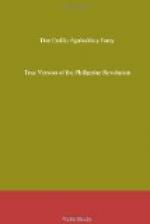The searching of houses was carried on just as it was during the Spanish regime, while the American soldiers at the outposts often invaded our lines, thus irritating our sentries. It would make this book a very large volume if I continued to state seriatim the abuses and atrocities committed by the American soldiery in those days of general anxiety.
It seemed as if the abuses were authorised or at least winked at in official quarters for the purpose of provoking an outbreak of hostilities. Excitement ran high among all classes of people, but the Filipino Government, which had assumed responsibility for the acts of the people, by the constant issue of prudent orders succeeded in calming the excited populace and maintained peace, advising all sufferers to be patient and prudent pending the arrival of the Civil Commission.
CHAPTER XVII
Impolitic Acts
At such a critical juncture as this, and before the anxiously-awaited Civil Commission arrived, it occurred to General Otis, Commandant of the American forces, to commit two more impolitic acts. One of them was the order to search our telegraph offices in Sagunro Street, in Tondo, where the searching party seized the apparatus and detained the officer in charge, Sr. Reyna, in the Fuerza Santiago [6] under the pretext that he was conspiring against the Americans.
How and why was Sr. Reyna conspiring? Was not this sufficient for the Filipino Government to give the order to attack and rescue Reyna and thereby we (eight thousand strong) be plunged immediately into war with the United States? Was there any reason for conspiring when the power was in our own hands? And, above all, would a telegraphist, be likely to interfere in affaires de guerre when there was an army near by to attend to such matters?
It was abundantly manifest that the object was by wounding the feelings of and belittling the Filipino Government to provoke a collision, and it was clear also that this system of exasperating us was not merely the wanton act of the soldiery but was actually prompted by General Otis himself, who, imbued with imperialistic tendencies, regarded the coming of the Civil Commission with disfavour and especially would it be unsatisfactory that this Commission should find the Philippines in a state of perfect tranquility, because it was evident to the said General, as well as to the whole world, that the Filipinos would assuredly have arrived at a definite amicable agreement with the aforesaid Commission if it reached the islands while peace prevailed.
We, the Filipinos, would have received the Commission with open arms and complete accord as honourable Agents of the great American nation. The Commissioners could have visited all our provinces, seeing and taking note of the complete tranquility throughout our territory. They could have seen our cultivated lands, examined our Constitution and investigated the administration of public affairs in perfect peace and safety, and have felt and enjoyed the inimitable charm of our Oriental style,—half negligent, half solicitude, warmth and chilliness, simple confidence and suspiciousness; characteristics which cause descriptions of contact with us to be depicted by foreigners in thousands of different hues.




